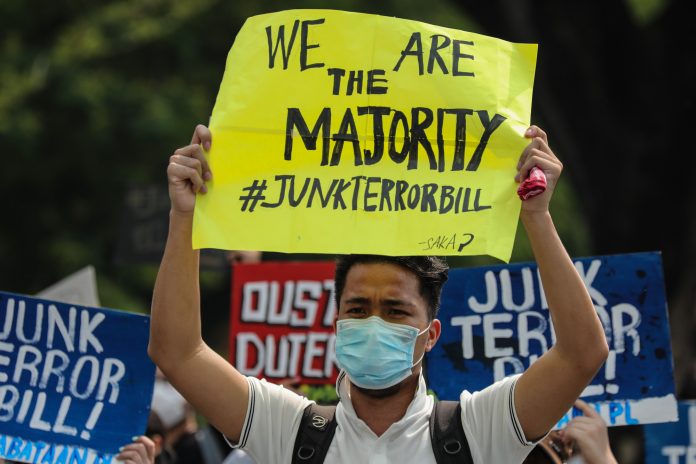THE ecumenical network of church leaders and organizations called “One Faith, One Nation, One Voice” is on the right track in pointing out that the proposed “Anti-Terrorism Act of 2020” already approved by both chambers of Congress and now only awaiting President Rodrigo Duterte’s signature would “cause a further shrinking of democratic space” and “weaken public discourse in the country.”
“A thriving democracy upholds freedom of speech, the rights to assembly and association, the right to expression of beliefs, and other inalienable rights of our people,” they stressed.
“We are speaking, even as we recognize that to do so is dangerous. For such a time as this, to remain silent only assures the impending destruction and abuse of our people,” the group added.
The statement, signed by prominent Church leaders, including Bishop Broderick Pabillo, apostolic administrator of the Archdiocese of Manila, Bishop Reuel Norman Marigza, general secretary of the National Council of Churches of the Philippines, and former Education Secretary Brother Armin Luistro, among others, adds to the growing concern by various sectors that the proposed law could very well bring the country closer to authoritarianism reminiscent of what transpired in the 1970s and 1980s, but even without a formal declaration of martial law.
What I find really questionable is why the bill has been the focus of attention by lawmakers when they should be prioritizing helping Filipinos adversely affected by COVID-19.
The proposed law will penalize those who will propose, incite, conspire, participate in the planning, training, preparation, and facilitation of a terrorist act. Those who will provide material support to terrorists, and recruit members in a terrorist organization, will just as well be arrested and detained even without warrant.
Any person who shall threaten to commit terrorism, and those who will propose any terroristic acts or incite others to commit terrorism shall suffer the penalty of 12 years behind bars.
A person suspected of committing terrorist acts may be detained for 14 days, which is extendible for another 10 days.
The vehement Church reaction to the proposed law is shared by Vice President Leni Robredo, opposition lawmakers, the Commission on Human Rights and other human rights advocates, and even netizens.
Opposition lawmakers are convinced that it is unconstitutional and “may be used against critics and opposition leaders.”
Senator Kiko Pangilinan said that the measure’s definition of terrorism is “vague,” making it open to abuses as common crimes can be framed by erring law enforcers.
At the House, Kabataan party-list Rep. Sarah Elago said the anti-terrorism bill” has no safeguards for the protection of human rights, redress of grievances” and can be “weaponized to silence critics, suppress dissent.”
The Commission on Human Rights also warned that the prolonged detention of suspects without a judicial warrant “may result [in] cruel, inhuman, and degrading treatment or torture.”
The Karapatan human rights group was even more caustic, slamming the amendments to the Anti-Terrorism law as proof of “Duterte’s brutal campaign of State terrorism” in a bid to “establish a full-blown fascist dictatorship and de facto martial law.”
For the International Coalition of Human Rights in the Philippines (ICHRP), the proposed law can only mean “all-out escalation of rights abuses.”
The group stressed that the proposed law was another way for Mr. Duterte to “institutionalize the war against dissent” even without the formal declaration of nationwide martial law.
Ordinary citizens using social media are also up in arms against the proposed law: A netizen succinctly pointed out: “Activism is not terrorism!” Another said: “Our heroes spent decades fighting for this country’s democracy yet this government is removing the right of freedom of speech (and) criminalizing criticism. This is not what we need during this pandemic.”
These are all valid concerns, from where I sit, and if signed into law, the new anti-terrorism bill would trample our fragile democracy underfoot, given the current administration’s predilection to short-circuit democratic processes and undermine the rule of law that’s been evident even under its continuing bloody war on illegal drugs.
Filipinos who cherish their rights and freedom under a democratic system should make their voices heard and demand that this piece of legislation be set aside as unconstitutional and anti-democratic.
Just imagine this, if the law comes into effect, as it is almost certain considering this administration’s mindset: If you, an ordinary citizen, dares to speak out against corruption, incompetence of public officials, or police brutality, you risk facing a long prison term because you would be considered a terrorist, just like the members of the Abu Sayyaf and other groups professing allegiance to the savage Islamic State.
Ernesto M. Hilario writes on political and social justice issues for various publications in the Philippines. The views and opinions expressed in this article are those of the author and do not necessarily reflect the official editorial position of LiCAS.news.









